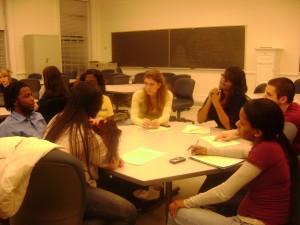Changing one’s mind is one of the three hardest things for a person to do, according to Anthony de Mello. The other two are returning good for evil and admitting we are wrong. But those two are for later articles. Changing our minds isn’t about compromising our principles or reversing our position on an issue that is important to us, though sometimes that is appropriate. Changing our minds is more often about changing our views of other people who are different in some way or of those who hold a view that we don’t agree with.
 I invited a guest presenter to the college class I taught, and he engaged the students in a challenging activity. The leader began by identifying a socially/politically charged issue that was important to the students. Frankly, I don’t remember what the issue was, but the class was pretty evenly divided, with strong feelings on each side. The focus could have been the war, abortion, stem cell research, internet privacy, or any number of other things. As it turned out, the issue was less important than the process that unfolded.
I invited a guest presenter to the college class I taught, and he engaged the students in a challenging activity. The leader began by identifying a socially/politically charged issue that was important to the students. Frankly, I don’t remember what the issue was, but the class was pretty evenly divided, with strong feelings on each side. The focus could have been the war, abortion, stem cell research, internet privacy, or any number of other things. As it turned out, the issue was less important than the process that unfolded.
Each student identified his or her position, pro or con, on that issue. Then, with the students sitting in their two respective camps, the leader gave the two groups some questions to consider, but they were told to consider those questions from the perspective of the opposing group. The questions were tough.
1. What values do you hold dear in order to maintain this position?
2. What other values are compromised in order to hold this position?
3. What was your experience or process for arriving at this position?
4. Develop 4 or 5 compelling arguments for why your position is valid.
Remember, this was while taking the opposing view! To take this assignment seriously, each group had to suspend their original views and consider why the other group thought, felt, and acted they way they did.
Had we simply engaged in a debate about the issue, no one would likely have learned anything new. The goal in a debate is to solidify one’s own views while trying to discredit the views of the others. In a debate, if compelling arguments don’t do the trick, the next step is to increase the volume and the intensity of the attacks on the other side. In this classroom exercise, the students were simply asked to take a position they would normally be opposed to, and to thoughtfully put themselves in the position of the people who held that position dearly.
It was an emotional and eye-opening experience for the students, and for me. I doubt that any of those students walked out of class that day with a new opinion about the topic. The goal was not to change anyone’s mind. The goal was to create some space in their opinions, to allow for some understanding and appreciation of those who held a different view, and to recognize the validity of those views even though there was disagreement.
 With that kind of openness, new possibilities arise. If the focus is, “Who’s right and who’s wrong?” little will change. If, however, the focus is to recognize the validity of the opposing views, to discover some appreciation for the people who hold opposing views, and to recognize that we all give up some things in order to hold onto our precious views, then we have some possibilities for construction action that will benefit all.
With that kind of openness, new possibilities arise. If the focus is, “Who’s right and who’s wrong?” little will change. If, however, the focus is to recognize the validity of the opposing views, to discover some appreciation for the people who hold opposing views, and to recognize that we all give up some things in order to hold onto our precious views, then we have some possibilities for construction action that will benefit all.
I wonder what such an exercise would look like if it were required in our state and national legislature rather than the high and mighty rhetoric we so often hear. I wonder what would happen if interfaith exercises, or even interdenominational exercises like this were required of our churches and religious groups. How would business be transformed if management and labor, from top to bottom, were required to sit in a room and go through this activity? How would our local, state, and national elections be different if every community and city engaged in this kind of experience rather than the screaming town hall meetings we witnessed last year?
It may not be necessary for us to change our views, but what a transformation if we could drop our prejudices about the people with whom we differ, and make respectful room for the differences.
1 Comment until now
Love this. This exercise creates a pause in thinking, that we often don’t take when listening to an opposing point of view. I am guilty of this myself. I have a visceral reaction when faced with an opinion I don’t agree with especially on a particularly charged issue. Empathy goes out the window. I hope I think about this article and those four questions the next time I encounter this.
Add your Comment!